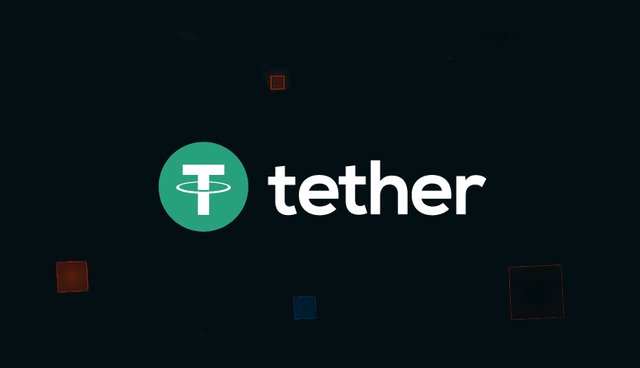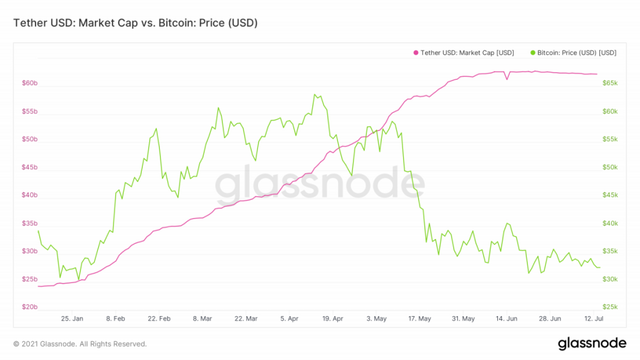
From the end of May (early June) we saw a relatively strange event in the market; The rapid growth of the Tetra market value stopped abruptly, just as the price of Bitcoin fell from its all-time high. Now that the price of bitcoin is stuck in the $ 30,000 to $ 40,000 range, there are repeated conversations that seek to answer one of the oldest questions in the field: Has Teter stopped pumping the price of bitcoin again? However, experts and traders in the digital currency market believe that the cessation of the supply of more tetris actually indicates that Bitcoin, as the king of digital currencies, is facing challenges that threaten its dominance. Experts cite China's restrictions on Chinese traders' access to Tetra, the emergence of a rival called the USDC, and legal pressures on Tetra as reasons why the new Tetra has been discontinued. According to Kevin Desk, Paolo Ardoino, Senior Director of Technology at Tetra, acknowledged the decline in demand for Tetra, saying it was not unique to Tetra. He said about this :
Demand for tetra sometimes rises and sometimes falls, and in recent weeks we have seen low demand. Teter is not the only stable Quinn that has seen declining demand.

China's restrictions on both mining and trading have had a devastating effect on bitcoin prices. The price of Bitcoin reached a high of $ 64,928 in April. Following the negative news from China, each bitcoin unit has now fallen by 52% to $ 31,000.
In addition to bitcoin, Tetra is one of the victims of China's restrictions; Because Teter is very popular and used among Chinese users and traders. Because buying and selling digital currencies in yuan is prohibited in China, the Chinese used the Tetra as a tool to circumvent this restriction and criticized their digital currencies through platforms such as OTC desks.
Last month, Chinese police arrested more than 1,000 people on money laundering charges. According to police, the men used digital currencies to circumvent the law. Similar actions against people who traded at trading desks and outside exchanges are one of the reasons why the growth of Tetra in China has slowed down significantly.
Annabelle Huang, senior executive at Amber Group Digital Asset Management, says:
Using digital currencies, cashing in or buying them has become extremely difficult in China. Many OTC trading desks have stopped trading.
The Hong Kong Lending Platform Babel recently announced that it would cut interest rates on Tetra deposits. The company cited low demand for this stable coin as its reason for the decision. However, the company did not provide a reason for the decline in demand.
China's legal restrictions on money laundering activities do not appear to be over. The China Morning Post reported Wednesday that Hong Kong Customs had busted a money laundering gang that used digital currencies, especially Tetra. The gang laundered about $ 155 million, according to the report. This is the first time Hong Kong has enforced such restrictions.
Dan Burke, BitGo's director of corporate sales in Asia and the Pacific, says:
Hong Kong News can handle all dollar trading tables
As Tetra slows, the USDC appears to be gaining ground day by day. USDC is another stable coin that Circle is responsible for offering and publishing.
Shortly after Circle announced plans to expand the USDC to a maximum of 10 more Chinese blocks, it was announced that the company was seeking a public offering of its shares through SPAC. Theron, led by Justin Sun, is one of the Chinese blockchain recently added to the USDC. According to the Circle website, one of the goals of this digital currency in the blockchain is to create the conditions for "growth in Asia" and other parts of the world. Due to the fact that blockchain offers cheaper and faster transactions than atrium, the tetris on theron are more than the tethers on the atrium; According to experts, Asian traders prefer cheap and fast transactions. Based on this fact, it can be said that the entry of the USDC into the ChinaTron bloc will be largely tempting for Asian traders.
Justin Sun said:
I think the USDC in Asia has a chance to compete with Tetra in the stable coin market. I feel that the Asian stable coin market needs more diversity in terms of infrastructure at the moment, and Asian traders are looking for more options.
According to Lane, unlike Tetra, which relies heavily on channels outside of exchanges, the USDC can be easily purchased because of the incentive customer service provided by Circle in Asia. He added:
Working with USDC is very simple. As soon as you provide the required documents, a person will contact the number via email.
It may be too early to say whether the USDC could break the dominance of the Asian stable coin market; The USDC, meanwhile, has been able to dominate decentralized finance. Almost half of the USDC supply is locked in smart contracts. According to Glassonood, only 20% of Tetra's supply is locked in smart contracts. Ryan Watkins, an analyst and researcher at Messari, said in a statement:
USDC is increasingly used in intra-chain payments. However, Tetra is mostly used in intra-exchange transactions and as a margin in futures transactions. It should not be forgotten that these transactions have decreased as the market calmed down.